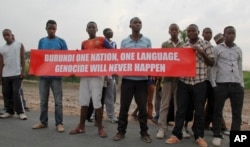Burundi’s president remained firm Friday in his rejection of an African Union-proposed peacekeeping force to help restore calm to his country.
“The people decided through the National Assembly,” President Pierre Nkurunziza told a visiting delegation of the U.N. Security Council. He said the African Union “must respect Burundi as a member state and we must be consulted” on the matter.
Last month, the African Union announced it would deploy a 5,000-strong “prevention and protection” force to Burundi for an initial period of six months, following election-related violence that killed at least 439 people since April and caused more than 220,000 to flee the country.
The situation in Burundi is expected to be a key topic when African heads of state meet next week at their annual summit in Addis Ababa.
Observers fear that the violence sparked by what is seen by many as an unconstitutional third term for Nkurunziza could result in another civil war between the country’s ethnic Tutsis and Hutus — similar to the one that plagued the country from 1993 to 2005.
Nkurunziza dismissed international concerns that a genocide, similar to the one that Rwanda experienced in 1994, could happen in Burundi.
“I’m here to guarantee that there will never be another genocide in Burundi,” he said of massacres during his country’s civil war.
Rwandan interference
He also lashed out at neighboring Rwanda, telling the Security Council that “the threat is not from within Burundi — it comes from outside. The Rwandan government must be told to stop.”
Nkurunziza’s government has previously accused Rwanda of supporting a rebel group that recruits and arms Burundian refugees on Rwandan territory.
Albert Shingiro, Burundi's permanent representative to the United Nations, who attended the meeting, said he welcomed remarks from his U.S. counterpart, Samantha Power, about the need to warn Rwanda not to interfere in Burundi.
Disappointment, but efforts continue
Power told reporters after the more than two-hour-long meeting with the president that “we did not achieve as much, frankly, as I think we would have liked.” She said, however, that the council would not be deterred, “because the cause of peace in Burundi is too important to give up.”
Council members have been urging the government to hold meaningful, inclusive dialogue with the opposition.
On Friday, they also held a series of meetings with political parties, civil society groups and religious leaders who reflected both pro-government and opposition views. They also met with a group of independent media representatives.
Power said the council believes that “a more substantial international presence” could help restore stability. That would include a beefed-up U.N. presence, led by the secretary-general’s special adviser, Jamal Benomar.
Rural retreat
The council met Nkurunziza at his rural retreat 100 kilometers north of the capital, Bujumbura. As their convoy snaked through the hills, it passed lush agricultural areas with banana groves and coffee and tea farms.
The convoy periodically encountered pro-government demonstrators carrying identical signs urging no interference and pronouncing Burundi a “peaceful country.” Some protesters chanted “Burundi sawa!” — “Burundi is OK!” in Swahili. Their numbers swelled to the hundreds just before the convoy approached the presidential residence.





